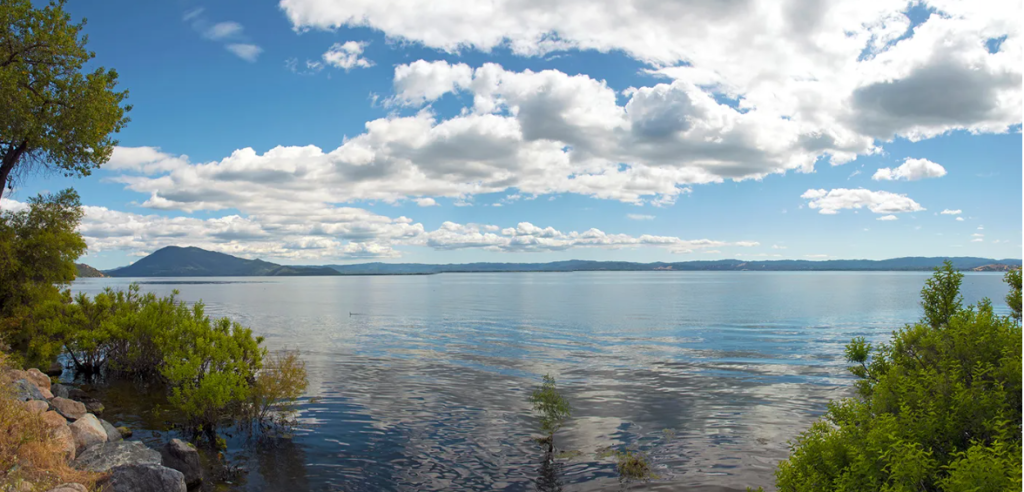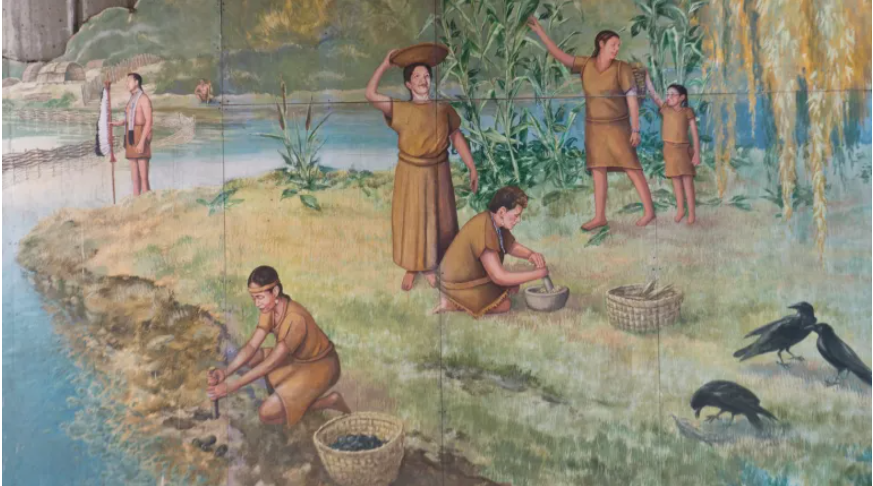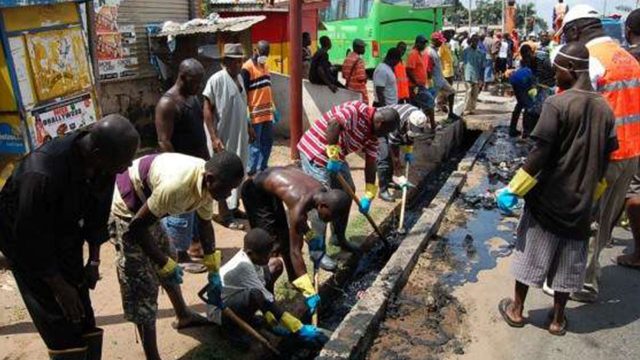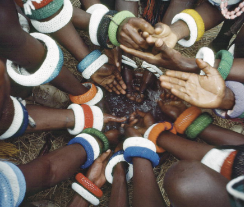In the traditional African society where leaves are used in product packaging, Fishes breath, Soil is healthy, streets and markets are clean and free from litters. Conversely, in half-baked copyist cosmopolitan African society, plastic pollution, air pollution and environmental degradation are rife; thus, the health of both animals and humans are endangered, just as the flora and fauna of the physical environment is lost. Like practice without theory, modern African society, even with its equipment and amenities (refuse bins, refuse trucks, pipe-borne water, etc.), have no underlining ecological philosophy; hence it still scores very low in environmental stewardship. Unfortunately, the failure of the modern African society in upholding environmental stewardship brings about liabilities that negatively impact the larger African society. Water pollution, air pollution, deforestation, biodiversity loss and oil spills have been identified among the leading environmental issues bedeviling Africa. Often times it is believed that industrialization brought about the various environmental issues; rather, the disconnect between home-made, age-long, Traditional Ecological Knowledge (TEK) in Africa and modern environmental policy development in the continent is to blame. While modern African society continues to struggle with the basic issues in environmental stewardship, Traditional Ecological Knowledge is replete with better solutions.

Traditional Ecological Knowledge (TEK)
Traditional Ecological Knowledge (TEK) refers to the accumulated knowledge, practices, beliefs, and insights that indigenous and local communities have developed over generations about their environment and natural resources. Africa’s Traditional Ecological Knowledge is embedded in the cultural orientations of her various indigenous and local groups. TEK in Africa plays a crucial role in sustainable resource management, biodiversity conservation, and overall community well-being; it also underscores the corporate social behavior of economic actors. Traditional Ecological Knowledge (TEK) offers veritable insights about practices and cultural orientations that promote responsible and harmonious interactions between human communities and their natural environments. It also drives the inter-connectedness between economic activities, community well-being and environmental stewardship. With no refuse trucks and refuse bins, rural Africa keeps her environment clean; even without a written environmental policy or a ministry of environment, rural Africa organizes local sanitization, cleans up her waterways, regulates actions and even fines environmental offenders.
For a better understanding of the breadth of what TEK entails, it is important to look at its various dimensions.

Values: – People who have lived in a community for generations develop affinity with the environment and are often the first to notice any signs of environmental change. This is because Traditional Ecological Knowledge (TEK) uses environmental knowledge and information garnered from centuries of living and interacting with the environment. Such information is retained, taught and passed down to generations through mentoring and storytelling. Thus, TEK is sometimes inter-woven with culture and manifests in different forms according to the prevalent culture. For example, knowledge of leaves and herbs as sources of medicine is expressed in Western Nigeria as ‘Agbo’ – medicinal syrup made by cooking leaves in water; whereas in Eastern Nigeria, same pharmaceutical knowledge is expressed majorly as ‘Mgborogwu’ – shrubs and barks soaked in local gin to produce medicinal values; or ‘Ahihia-ogwu’ – leaves cooked and used for bathing a sick person. In other forms, TEK as cultural values manifests in the inherent cultural orientation as seen in most parts of Eastern Nigeria where environmental sanitation is one of the responsibilities of younger age grades who come out once every month with Cutlasses and hoes to clean the environment; those who fail to turn up are fined. TEK as value is what the Japanese fan have displayed in recent World Cups where their fans where seen clean-up the entire Stadium after each match, even when they lost. TEK, when embedded as values reflects in policy strategies since the policy formulators already have same values in-born.
Methodology: – Like modern science, Traditional Ecological Knowledge (TEK) is also taught; TEK also recognizes that knowledge is dynamic and growing; both works with events and observations. But unlike modern science, TEK is not taught in classrooms or documented in textbooks to be read; rather, TEK is taught and passed on informally as part of the socialization and community life, thus, it becomes a lifestyle rather than texts to be memorized.

Perception: – In traditional African society, TEK communicates environmental stewardship as citizens’ obligation rather than responsibility. As in the examples mentioned, participating in the monthly clean-up exercise becomes one of the duties every adult male owes the community; this obligation is in-born and does not require a set of legislations to activate or enforce it .
Originality: A striking aspect of TEK is its originality: in Africa, Asia or any part of the world where it exists, TEK is always original, not copied; homemade, not imported. Being home-grown means that TEK stems from the peculiarities in each environment, hence it is beneficial in understanding and dealing with the environmental issues in its locality.
TEK and Environmental Stewardship
In all its forms and dimensions, experts believe that Traditional Ecological Knowledge, when properly harnessed, can help the possessor-nations make significant progress towards environmental stewardship. Specific areas where Traditional Ecological Knowledge can be employed in driving environmental stewardship include: Resource Management; Biodiversity Conservation; Adaptation to Climate Change; Building Resilience; and Community Engagement.
Through localized methods that are older than civilization, TEK offers sustainable solutions and approaches to managing natural resources; this stems from agelong understanding of the ecosystem and resource availability. Traditional Ecological Knowledge also builds capacity to identify, respect and protect key biodiversity hotspots, migratory routes, and critical habitats thereby engendering biodiversity conservation. On TEK and adaptation to climate change, indigenous communities have over the years developed techniques for managing water resources, diversifying crops, and adjusting livelihoods to cope with varying climate conditions. Furthermore, TEK emboldens communities in the face of environmental shocks by ensuring long-term availability of essential resources through home-grown knowledge and indigenous practices that help maintain ecosystem resilience. Another takeaway from TEK and environmental stewardship is its mode of community engagement. TEK offers a knowledge-based community engagement rather than rule-based engagement: in the later, it is about rules and defaulters; whereas in the former, it is about knowledge and commitment.

These been said, Africa stands to gain more traction and trajectory in her journey towards sustainable development if her leaders and policy makers would return to their roots and draw from the same Traditional Ecological Knowledge (TEK) that sustained their progenitors long before the onset of civilization.

The CSR Arena is a CSR advocacy and sustainability-reporting-analysis champion. We encourage and celebrate effective CSR and positive social impact by responsible corporate citizens; we celebrate international best practices in sustainability reporting across different economic divides. Our goal is to realize the dream of development scholars that, ‘corporates, more than governments, would bring about the much needed sustainable development across the globe. We partner with FBOs, NGOs, CBOs, governments and corporates to spread the message of sustainable development and corporate sustainability. Our platforms bear tales of good corporate citizenship – grab the microphone that you may be heard. Contact: news@thecsrarena.com



